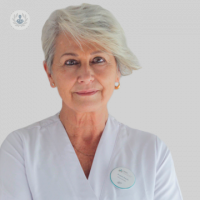Written by:
Dra.. Àngels Bayés Rusiñol - Director of the Parkinson unit
Rehabilitation is a fundamental pillar in the treatment of Parkinson's and other neurodegenerative diseases, effectively complementing medical treatment. There is increasing evidence that the treatment must be comprehensive and multidisciplinary considering all aspects that affect the patient's health status. For this purpose, the systematic assessment of the affected person in all its dimension. Thus, once a correct medical diagnosis of the disease and a pharmacological treatment have been obtained, both motor functionality and communicative deficiencies, the ability to perform activities of daily living, and the cognitive and psychological state of the patient. It is also interesting to assess the state of quality of life and nutritional status. The Uparkinson team is expert in performing this assessment and the treatment with complementary therapies that derive. Our center consensues the treatments in equipment to obtain the maximum effectiveness of the treatment. We have individual sessions, group sessions and there is also the possibility of doing online therapies.
Sheila Alcaine - Responsible for the unit of Physiotherapy and Berta Mestre - Physiotherapist
Most diseases affecting the central nervous system are associated with movement disorders. It can affect tone, muscle strength, coordination, balance and posture. These changes may cause difficulties in controlling movement as well as in gait especially, coordination and fine motor skill. After the diagnosis is important to apply the treatment in an early manner with a preventive purpose. In advanced stages the main objective of physiotherapy will be to reduce the impact of the consequences of the disease. Uparkinson's team of physiotherapists aims to improve the quality of life of those affected. This is done through rehabilitation or functional readaptation to maintain their independence in daily life. In our center an initial exhaustive assessment is made from which a personalized treatment will be planned either in our facilities or at home. This initial assessment will also serve to monitor the evolution periodically. The involvement of the patient and his / her caregivers in the treatment is a fundamental aspect for the good development of the rehabilitation program. There are specific techniques that may be beneficial in these diseases, the application of intermittent mechanical vibrations, for example, improves muscle tone and balance. In the case of Parkinson's one of the most annoying problems are gait blocks, the use of external clues can be of great help. The UParkinson team is working on a European project, Rempark, to develop an automatic detection and resolution system for walking problems. Some scientific publications confirm that the practice of physical exercise improves the evolution of neurodegenerative diseases.
Anna Prats - Head of the Neuropsychology Unit
At the Parkinson's Unit we take care of the patient in an integral way and we always take care of him according to his needs. We have a team specialized in the detection of cognitive disorders, that is, in the detection of disorders of memory, attention, concentration, which frequently may appear in Parkinson's disease or other disorders. In addition, here in the Parkinson's Unit, we perform very comprehensive and sensitive assessments that are able to detect these cognitive disorders very early and work together with the patient and the family to prevent such disorders and slow their evolution, especially trying not to affect or that affect as little as possible their activities of daily living. We program a personalized treatment in which we use different techniques and tools depending on the type of needs of each affected. One of the tools we use to stimulate and train cognitive functions are computer programs. Our center is a pioneer in the application of this type of programs. In an investigation we obtained very positive results that were published in one of the most prestigious journals at the international level on movement disorders. In addition to the Parkinson's Unit we offer both psycho-educational programs and individualized psychological interventions for those patients and families who require it since it has been seen that psychological intervention can help improve the well-being of both patients and their families.
Cristina Petit - Head of the Speech-Language Unit
Neurodegenerative diseases are often accompanied by communication difficulties. 90% of people with Parkinson's will have speech and voice alterations during the course of the disease. They will also have alterations in the eating process and in the swallowing process. Speech therapy aims to make patients aware of their communicative difficulties and learn techniques and strategies that improve the intelligibility of their discourse. It also prevents and treats swallowing disorders. At UParkinson we carry out individual and group treatments as well as online through videoconference. This modality is especially useful and convenient for those who are unable to move. Likewise, the efficacy of the speech therapy intervention in Parkinson's patients has been demonstrated and in some of them the maintenance of the benefit between 6 and 12 months after treatment.



